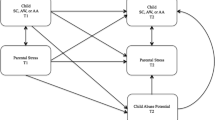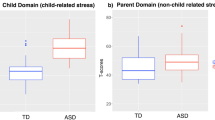Abstract
Low family socioeconomic status (SES) is a robust risk factor for adverse child outcomes, yet the specific processes that account for this risk are not fully understood. This study examines whether and how variation in two adverse factors, stressful life events and harsh parental discipline, affect children’s social competence within a high-risk environment, and whether some children are more vulnerable to these effects than others. Data were collected from 207 families of kindergarten children at risk for behavioral maladjustment. Children’s physiological regulation (respiratory sinus arrhythmia; RSA) measured during rest was examined as a moderator of risk exposure. Results indicate that both greater exposure to life stress and harsh discipline were correlated with lower social competence. Although children’s resting RSA was not a direct predictor of their social competence, it moderated the association between life stress and social competence. Greater exposure to life stress was more strongly associated with lower social competence among children with lower resting RSA. Higher RSA may help to buffer the effects of stress and facilitate appropriate social development. RSA did not moderate the effects of harsh discipline. This differential pattern of findings suggests that children’s physiological regulation can facilitate an effective response to situational stressors, but may be less efficacious in buffering against stress in the context of the parent-child relationship.

Similar content being viewed by others
References
Abry, T., Latham, S., Bassok, D., & LoCasale-Crouch, J. (2015). Preschool and kindergarten teachers’ beliefs about early school competencies: Misalignment matters for kindergarten adjustment. Early Childhood Research Quarterly, 31, 78–88. https://doi.org/10.1016/j.ecresq.2015.01.001.
Aiken, L. S., & West, S. G. (1991). Multiple regression: Testing and interpreting interactions. Newburg Park, CA: Sage.
Arditti, J. A. (2016). A family stress-proximal process model for understanding the effects of parental incarceration on children and their families. Couple and Family Psychology: Research and Practice, 5(2), 65–88. https://doi.org/10.1037/cfp0000058.
Baumrind, D. (2013). Authoritative parenting revisited: History and current status. In R. E. Larzelere, A. S. Morris & A. W. Harrist (Eds.), Authoritative parenting: Synthesizing nurturance and discipline for optimal child development (pp. 11–34). Washington, DC: American Psychological Association.
Beauchaine, T. (2001). Vagal tone, development, and Gray’s motivational theory: Toward an integrated model of autonomic nervous system functioning in psychopathology. Development and Psychopathology, 13(2), 183–214. https://doi.org/10.1017/S0954579401002012.
Beauchaine, T. P., & Gatzke-Kopp, L. M. (2012). Instantiating the multiple levels of analysis perspective in a program of study on externalizing behavior. Development and Psychopathology, 24(3), 1003–18. https://doi.org/10.1017/S0954579412000508.
Beauchaine, T. P., & Mead, H. K. (2006). Some recommendations for testing mediating and moderating effects in treatment-outcome research. International Journal of Psychology Research, 1, 97–117.
Blair, C. (2002). School readiness: Integrating cognition and emotion in a neurobiological conceptualization of children’s functioning at school entry. American Psychologist, 57(2), 111–127. https://doi.org/10.1037//0003-066X.57.2.111.
Blair, C., & Raver, C. C. (2014). Closing the achievement gap through modification of neurocognitive and neuroendocrine function: Results from a cluster randomized controlled trial of an innovative approach to the education of children in kindergarten. PLoS ONE, 9(11). https://doi.org/10.1371/journal.pone.0112393
Blair, C., & Raver, C. C. (2015). School readiness and self-regulation: A developmental psychobiological approach. Annual Review of Psychology, 66, 711–731. https://doi.org/10.1146/annurev-psych-010814-015221.
Blandon, A. Y., Calkins, S. D., Grimm, K. J., Keane, S. P., & O’Brien, M. (2010). Testing a developmental cascade model of emotional and social competence and early peer acceptance. Development and Psychopathology, 22(4), 737–748. https://doi.org/10.1017/S0954579410000428.
Bradley, R. H., & Corwyn, R. F. (2002). Socioeconomic status and child development. Annual Review of Psychology, 53, 371–399. https://doi.org/10.1146/annurev.psych.53.100901.135233.
Calkins, S. D., Graziano, P. A., & Keane, S. P. (2007). Cardiac vagal regulation differentiates among children at risk for behavior problems. Biological Psychology, 74(2), 144–153. https://doi.org/10.1016/j.biopsycho.2006.09.005.
Cavanagh, S. E., & Huston, A. C. (2008). The timing of family instability and children’s social development. Journal of Marriage and Family, 70(5), 1258–1270. https://doi.org/10.1111/j.1741-3737.2008.00564.x.
Collins, L. M., Schafer, J. L., & Kam, C. M. (2001). A comparison of inclusive and restrictive strategies in modern missing data procedures. Psychological Methods, 6(4), 330–51. https://doi.org/10.1037/1082-989X.6.4.330.
Compas, B. E., Banez, G. A., Malcarne, V., & Worsham, N. (1991). Perceived control and coping with stress: A developmental perspective. Journal of Social Issues, 47(4), 23–34. https://doi.org/10.1111/j.1540-4560.1991.tb01832.x.
Conduct Problems Prevention Research Group. (1999). Initial impact of the Fast Track prevention trial for conduct problems: I. The high-risk sample. Journal of Consulting and Clinical Psychology, 67(5), 648–657. https://doi.org/10.1037/0022-006X.67.5.648.
Dearing, E., McCartney, K., & Taylor, B. A. (2001). Change in family income-to-needs matters more for children with less. Child Development, 72(6), 1779–1793. https://doi.org/10.1111/1467-8624.00378.
Deater-Deckard, K., Dodge, K. A., Bates, J. E., & Pettit, G. S. (1996). Physical discipline among African American and European American mothers: Links to children’s externalizing behaviors. Developmental Psychology, 32(6), 1065–1072. https://doi.org/10.1037/0012-1649.32.6.1065.
Duncan, G. J., & Brooks-Gunn, J. (2000). Family poverty, welfare reform, and child development. Child Development, 71(1), 188–196. https://doi.org/10.1111/1467-8624.00133.
El-Sheikh, M. (2001). Parental drinking problems and children’s adjustment: Vagal regulation and emotional reactivity as pathways and moderators of risk. Journal of Abnormal Psychology, 110(4), 499–515. https://doi.org/10.1037//0021-843X.110.4.499.
El-Sheikh, M., Harger, J., & Whitson, S. M. (2001). Exposure to interparental conflict and children’s adjustment and physical health: The moderating role of vagal tone. Child Development, 72(6), 1617–1636. https://doi.org/10.1111/1467-8624.00369.
El-Sheikh, M., & Hinnant, J. B. (2011). Marital conflict, respiratory sinus arrhythmia, and allostatic load: Interrelations and associations with the development of children’s externalizing behavior. Development and Psychopathology, 23(3), 815–829. https://doi.org/10.1017/S0954579411000320.
Enders, C. (2010). The imputation phase of multiple imputation. In D. A. Kenny, & T. D. Little (Series Ed.), Methodology in the Social Sciences: Applied missing data analysis (pp. 187–216). New York, NY: Guilford Press.
Fabes, R. A., Eisenberg, N., Karbon, M., Troyer, D., & Switzer, G. (1994). The relations of children’s emotion regulation to their vicarious emotional responses and comforting behaviors. Child Development, 65(6), 1678–1693. https://doi.org/10.2307/1131287.
Faul, F., Erdfelder, E., Lang, A.-G., & Buchner, A. (2007). G*Power 3: A flexible statistical power analysis program for the social, behavioral, and biomedical sciences. Behavior Research Methods, 39(2), 175–191. https://doi.org/10.3758/BF03193146.
Fortunato, C. K Gatzke-Kopp, L. M Ram, N (2013). Associations between respiratory sinus arrhythmia reactivity and internalizing and externalizing symptoms are emotion specific. Cognitive, Affective & Behavioral Neuroscience, 13(2), 238–251. https://doi.org/10.3758/s13415-012-0136-4.
Gatzke-Kopp, L. M. (2016). Diversity and representation: Key issues for psychophysiological science. Psychophysiology, 53(1), 3–13. https://doi.org/10.1111/psyp.12566.
Gatzke-Kopp, L. M., Greenberg, M. T., Fortunato, C. K., & Coccia, M. A. (2012). Aggression as an equifinal outcome of distinct neurocognitive and neuroaffective processes. Development and Psychopathology, 24(3), 985–1002. https://doi.org/10.1017/S0954579412000491.
Geller, A., Garfinkel, I., Cooper, C., & Mincy, R. (2009). Parental incarceration and child wellbeing: Implications for urban families. Social Science Quarterly, 90(5), 1186–1202. https://doi.org/10.1111/j.1540-6237.2009.00653.x.
Hinnant, J. B., Erath, S. A., & El-Sheikh, M. (2015). Harsh parenting, parasympathetic activity, and development of delinquency and substance use. Journal of Abnormal Psychology, 124(1), 137–151. https://doi.org/10.1037/abn0000026.
Jackson, Y., & Warren, J. S. (2000). Appraisal, social support, and life events: Predicting outcome behavior in school-age children. Child Development, 71(5), 1441–1457. https://doi.org/doi:10.1111/1467-8624.00238.
Jones, D. E., Greenberg, M., & Crowley, M. (2015). Early social-emotional functioning and public health: The relationship between kindergarten social competence and future wellness. American Journal of Public Health, 105(11), 2283–2290. https://doi.org/10.2105/AJPH.2015.302630.
Lansford, J. E., Dodge, K. A., Malone, P. S., Bacchini, D., Zelli, A., & Chaudhary, N., et al. (2005). Physical discipline and children’s adjustment: Cultural normativeness as a moderator. Child Development, 76(6), 1234–1246. https://doi.org/10.1111/j.1467-8624.2005.00847.x.
Lengua, L. J., Honorado, E., & Bush, N. R. (2007). Contextual risk and parenting as predictors of effortful control and social competence in preschool children. Journal of Applied Developmental Psychology, 28(1), 40–55. https://doi.org/10.1016/j.appdev.2006.10.001.
Mackenbach, J. D., Ringoot, A. P., Van Der Ende, J., Verhulst, F. C., Jaddoe, V. W. V., & Hofman, A., et al. (2014). Exploring the relation of harsh parental discipline with child emotional and behavioral problems by using multiple informants. The Generation R study. PLoS ONE, 9(8), 1–9. https://doi.org/10.1371/journal.pone.0104793.
McLaughlin, K. A., & Hatzenbuehler, M. L. (2009). Stressful life events, anxiety sensitivity, and internalizing symptoms in adolescents. Journal of Abnormal Psychology, 118(3), 659–669. https://doi.org/10.1037/a0016499.
Moore, G. A. (2010). Parent conflict predicts infants’ vagal regulation in social interaction. Development and Psychopathology, 22(1), 23–33. https://doi.org/10.1017/S095457940999023X.
Morris, A. S., Silk, J. S., Steinberg, L., Myers, S. S., & Robinson, L. R. (2007). The role of the family context in the development of emotion regulation. Social Development, 16(2), 361–388. https://doi.org/10.1111/j.1467-9507.2007.00389.x.
Obradović, J., Bush, N. R., Stamperdahl, J., Adler, N. E., & Boyce, W. T. (2010). Biological sensitivity to context: The interactive effects of stress reactivity and family adversity on socioemotional behavior and school readiness. Child Development, 81(1), 270–89. https://doi.org/10.1111/j.1467-8624.2009.01394.x.
Porges, S. W. (2001). The polyvagal theory: Phylogenetic substrates of a social nervous system. International Journal of Psychophysiology, 42(2), 123–146. https://doi.org/10.1016/S0167-8760(01)00162-3.
Porges, S. W. (2007). The polyvagal perspective. Biological Psychology, 74(2), 116–143. https://doi.org/10.1016/j.biopsycho.2006.06.009.
Preacher, K. J., Curran, P. J., & Bauer, D. J. (2006). Computational tools for probing interactions in multiple linear regression, multilevel modeling, and latent curve analysis. Journal of Educational and Behavioral Statistics, 31(4), 437–448. https://doi.org/10.3102/10769986031004437.
Raver, C. C., Blair, C., & Garrett-Peters, P. (2015). Poverty, household chaos, and interparental aggression predict children’s ability to recognize and modulate negative emotions. Development and Psychopathology, 27(3), 695–708. https://doi.org/10.1017/S0954579414000935.
Repetti, R. L., Taylor, S. E., & Seeman, T. E. (2002). Risky families: Family social environments and the mental and physical health of offspring. Psychological Bulletin, 128(2), 330–366. https://doi.org/10.1037/0033-2909.128.2.330.
Roy, A., & Raver, C. (2014). Are all risks equal? Early experiences of poverty-related risk and children’s functioning. Journal of Family Psychology, 28(3), 391–400. https://doi.org/10.1037/a0036683.
Scaramella, L. V., & Leve, L. D. (2004). Clarifying parent-child reciprocities during early childhood: The early childhood coercion model. Clinical Child and Family Psychology Review, 7(2), 89–107. https://doi.org/10.1023/B:CCFP.0000030287.13160.a3.
Semrud-Clikeman, M. (2007). Social competence in children. Social Competence in Children (pp. 1–10). New York City: Springer.
Smith, J. D., Dishion, T. J., Shaw, D. S., Wilson, M. N., Winter, C. C., & Patterson, G. R. (2014). Coercive family process and early-onset conduct problems from age 2 to school entry. Development and Psychopathology, 26(4.1), 917–932. https://doi.org/10.1038/nmeth.2250.Digestion.
Snyder, J., Cramer, A., Afrank, J., & Patterson, G. R. (2005). The contributions of ineffective discipline and parental hostile attributions of child misbehavior to the development of conduct problems at home and school. Developmental Psychology, 41(1), 30–41. https://doi.org/10.1037/0012-1649.41.1.30.
Webster-Stratton, C. (1990). Stress: A potential disruptor of parent perceptions and family interactions. Journal of Clinical Child Psychology, 19(4), 302–312. https://doi.org/10.1207/s15374424jccp1904_2.
Webster-Stratton, C., & Hammond, M. (1998). Conduct problems and level of social competence in Head Start children: Prevalence, pervasiveness, and associated risk factors. Clinical Child and Family Psychology Review, 1(2), 101–124. https://doi.org/10.1023/A:1021835728803.
Wentzel, K. R. (1991). Relations between social competence and academic achievement in early adolescence. Child Development, 62(5), 1066–1078. https://doi.org/10.1111/j.1467-8624.1991.tb01589.x.
Werthamer-Larsson, L., Kellam, S., & Wheeler, L. (1991). Effect of first-grade classroom environment on shy behavior, aggressive behavior, and concentration problems. American Journal of Community Psychology, 19(4), 585–602. https://doi.org/10.1007/BF00937993.
Whitson, S. M., & El-Sheikh, M. (2003). Moderators of family conflict and children’s adjustment and health. Journal of Emotional Abuse, 3(1–2), 47–73. https://doi.org/10.1300/J135v03n01_03.
Wolff, B. C., Wadsworth, M. E., & Santiago, C. D. (2010). Family poverty, stress, and coping. In R. J. R. Levesque (Ed.), Encyclopedia of Adolescence (pp. 941–951). New York: Springer.
Author Contributions
K.C.: formed the research questions, analyzed the data, and wrote the manuscript. L.G.-K.: collaborated with the analyses and writing of the final manuscript. G.F.: provided guidance for the family-related concepts of the study and collaborated in the editing of the final manuscript.
Author information
Authors and Affiliations
Corresponding author
Ethics declarations
Conflict of Interest
The authors declare that they have no competing interests.
Ethical Approval
All procedures performed in this study involving human participants were in accordance with the ethical standards of the Pennsylvania State University IRB and with the 1964 Helsinki declaration and its later amendments.
Informed Consent
Informed consent was obtained from all individual participants included in the study.
Rights and permissions
About this article
Cite this article
Creavey, K.L., Gatzke-Kopp, L.M. & Fosco, G.M. Differential Effects of Family Stress Exposure and Harsh Parental Discipline on Child Social Competence. J Child Fam Stud 27, 483–493 (2018). https://doi.org/10.1007/s10826-017-0913-3
Published:
Issue Date:
DOI: https://doi.org/10.1007/s10826-017-0913-3




